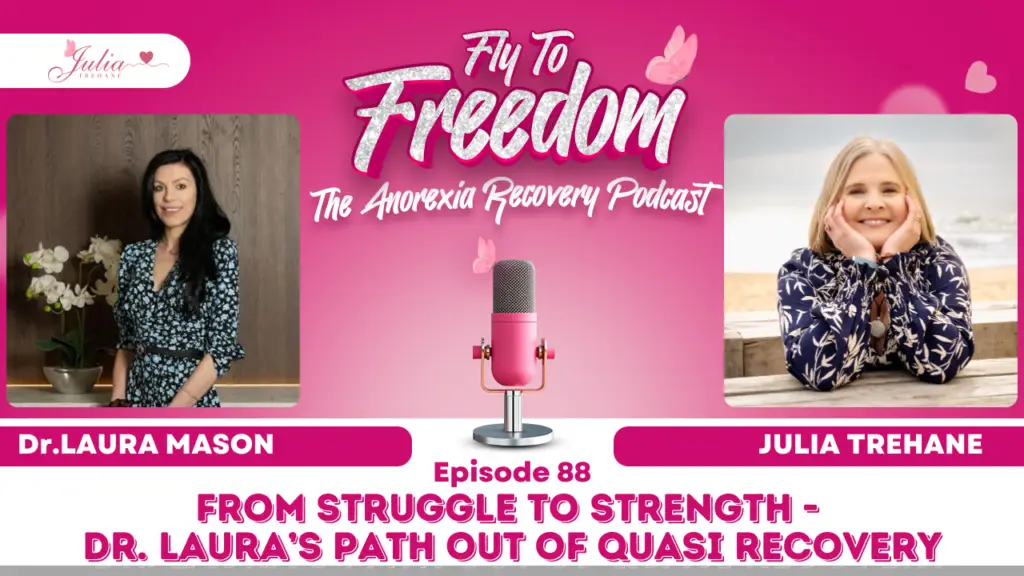Recovery from an eating disorder is a journey—an often messy, emotional, and transformative one. Along the way, many people reach a stage called quasi-recovery, where things look fine on the surface, but deeper struggles remain unresolved. If you’re feeling stuck in this middle ground, you’re not alone, and there is hope for full recovery. Let’s dive into everything you need to know about quasi-recovery, why it happens, and how to move past it.
What Is Quasi-Recovery?
Quasi-recovery (or partial recovery) is like standing at a halfway point in your eating disorder recovery journey. You’ve made progress—perhaps your weight has stabilized, or you’ve stopped some harmful behaviors like purging or excessive exercise. However, the mental and emotional grip of the disorder still lingers.
While quasi-recovery can feel safer than the chaos of an active eating disorder, it’s also a trap. You’re not living freely because disordered thoughts, anxieties, and behaviors are still controlling parts of your life.
How Quasi-Recovery Shows Up:
- Outward Progress, Inner Struggle: You might eat “normally” but still feel guilt, shame, or fear around food.
- Selective Change: Letting go of some disordered behaviors (like calorie counting) but holding onto others (like avoiding fear foods).
- Rigid Rules: Adopting a “healthy” diet that masks restrictive tendencies.
- Emotional Distress: Still worrying excessively about weight, appearance, or control.
Quasi-recovery often feels like survival, not freedom. It’s a step in the right direction but far from the vibrant, fulfilling life you deserve.
Why Do People Get Stuck in Quasi-Recovery?
There are many reasons why someone might settle into quasi-recovery:
1. Fear of the Unknown
Letting go of disordered behaviors and thoughts can feel terrifying. Eating disorders often provide a false sense of control or safety, so full recovery can seem like a risky leap.
2. Societal Pressure
The world praises “healthy eating” and “staying in shape,” making it harder to recognize when seemingly normal habits are actually disordered.
3. Incomplete Treatment
Traditional treatments may focus on physical recovery (like weight restoration) but fail to address the emotional and psychological causes of the eating disorder.
4. Comfort Zone
Quasi-recovery is familiar—it feels like progress without pushing too far out of your comfort zone. Unfortunately, it keeps you stuck in a limbo state.
The Risks of Staying in Quasi-Recovery
Quasi-recovery may feel like a safe middle ground, but it’s not without its risks:
- Relapse: Unresolved emotional and psychological issues can pull you back into full-blown disordered behaviors.
- Mental Exhaustion: Constantly battling food rules, guilt, and fear is draining, even if you look “fine” on the outside.
- Physical Health Risks: If restrictive eating patterns or other behaviors continue, they can lead to long-term damage.
- Missed Opportunities: Quasi-recovery robs you of the joy, spontaneity, and connection that full recovery brings.
How to Move Beyond Quasi-Recovery
Full recovery is about more than eating—it’s about healing your relationship with food, your body, and yourself. Here’s how you can take the next step:
1. Challenge Fear Foods
Are there foods you still avoid because they feel “bad” or “unsafe”? Recovery means welcoming all foods into your life without judgment. Start small by incorporating one fear food at a time, with support if needed.
2. Let Go of the Scale
The number on the scale doesn’t define your recovery—or your worth. Break the habit of weighing yourself and focus instead on how you feel mentally, emotionally, and physically.
3. Work with the Right Support
Full recovery often requires guidance from professionals who understand both the physical and emotional aspects of eating disorders. Consider working with:
- A good recovery coach who can personalize your journey and help with the mental work.
- A therapist trained in Cognitive Behavioral Therapy (CBT) or Dialectical Behavior Therapy (DBT).
- A registered dietitian who specializes in eating disorders and intuitive eating.
4. Focus on Emotional Healing
Eating disorders aren’t really about food—they’re about deeper issues like perfectionism, control, or trauma. Engage in inner work like:
- Journaling to explore your thoughts and feelings.
- Inner child work to uncover past wounds that influence your eating patterns.
- Self-compassion practices to build a kinder relationship with yourself.
5. Reframe Your Definition of Health
Health isn’t just about what you eat or how you look. It’s about mental clarity, emotional peace, and the ability to live fully. Challenge societal pressures and create your own definition of what health and happiness mean to you.
6. Build a Support Network
Recovery is hard to do alone. Surround yourself with people who uplift and support you—friends, family, or even online communities. They can offer encouragement and accountability as you take steps toward full recovery.
What Full Recovery Looks Like
Full recovery is more than a lack of symptoms—it’s about mental freedom. Imagine:
- Eating what you love without overthinking.
- Feeling confident and at peace in your body.
- Living a life filled with joy, connection, and purpose, free from the shadows of your eating disorder.
Have a listen to this inspiring conversation with Dr Laura, who overcame quasi recovery to achieve full freedom. Click on the image or visit your favourite podcast player and search Fly To Freedom and choose episode 88.
Action Steps to Take Today
- Write down one food rule or fear you want to challenge this week.
- List 3 ways your eating disorder still impacts your life and how you’d like to feel instead.
- Reach out to someone—a coach, therapist, or trusted friend—for support in moving forward.
- Reflect on your definition of recovery: What does full freedom look like to you?
In my Gold Standard 1:1 Coaching, I help clients uncover the root causes of their anorexia. Together, we address both the trauma and the eating disorder, creating a path toward lasting recovery. We work on rebuilding interoceptive awareness, emotional resilience, and a compassionate relationship with food and the body. Sometimes my clients have made really good progress, but get stuck in quasi recovery, eating normally, but still having lots of disordered thoughts. I help by supporting that last stage in their journey, reframing thoughts, working on the mind.
You can also sign up for my Daily Love email series, in which I send you a daily mantra or affirmation. These mantras help ground you in your recovery journey and provide daily encouragement. You can also follow me on Instagram @juliatrehane for recovery tips and inspiration.
Next Steps
If this blog resonated with you, take the next step toward freedom—I’m here to help you. For my gold standard 1:1 coaching, reach out to me here:
I also offer lots of free resources: sign up to receive daily mantras and my free recovery guide when you join my email community. You can do this here.
Follow me on Instagram for lots of helpful tips @juliatrehane.


